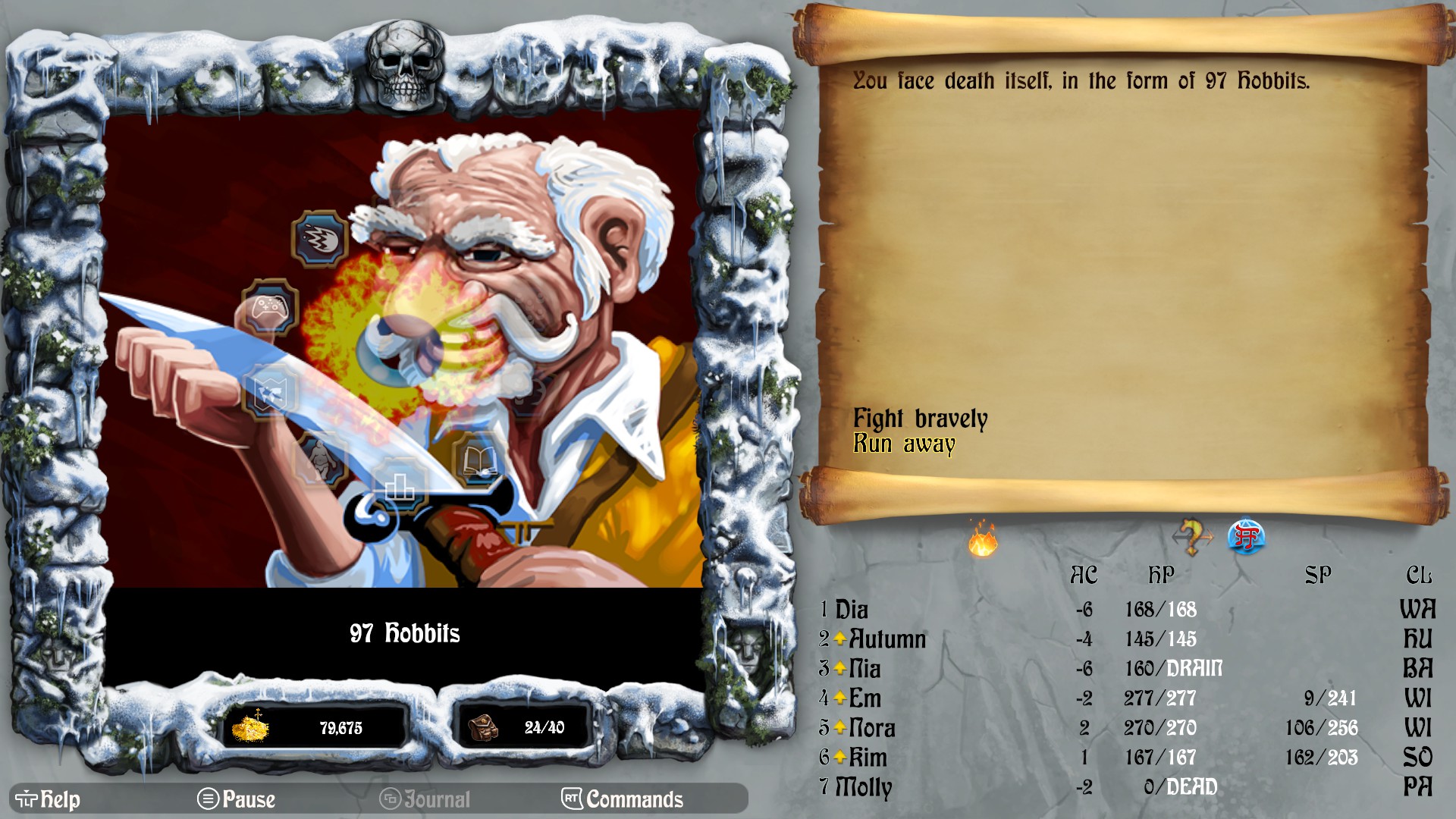Released: Dec 31, 1985
Version played: The Bard’s Tale Trilogy (2018)
I fell into The Bard’s Tale like a black hole. Twenty hours on the first game alone. When I closed my eyes I could see the grids of Skara Brae. When I sat in silence I could hear the spell sound effect clipping over itself as it activated 96 times in a row. I made a party. It wasn’t right. I subbed in some new guys and benched some old. I class changed my Mages through the perfect sequence of the four magical classes, and for my foresight was rewarded with three death dealing Wizards on the back row. We mapped the town, we solved the riddles (I had to google less than I thought, honestly!), and we freed Skara Brae from its icy confinement; yet honestly I feel like I’ve barely scratched the surface.
The Bards Tale takes Wizardry and expands it to bursting like it was a balloon. It’s a very modern feeling successor. By which I mean the processes of streamlining rough edges while expanding scope and featureset was as much a part of video games in the 80s as it is today. We didn’t just forget about the Purity of Design overnight and decide to make Assassin’s Creed 23; this is how we got there. This is the path we were always on. Wizardry is, as I said when I played it, a perfect game. Not in that it’s the greatest game ever made but that it is elemental in its design. Nothing could be removed, nothing taken away. It was born whole.
So here comes The Bards Tale to cram, as I understand it, pretty much the entire rest of D&D in here. The class list is significantly larger, and the variance between each even greater. There are more status effects, more spells, more synergies, more enemies and more dungeon. You’re not descending down into the depths, you’re exploring the cellars and catacombs and castles and keeps of Skara Brae, and as such for how similar it is (the core really is identical) it could not feel more different. This is a game where you are free to adventure, explore, experiment with builds and party composition, find the most efficent grinding spots and just generally break it over your knee. The cost and risk of resurrection has been significantly reduced. Death is a timesink, but not a catastrophe. It is a minor offset. And hey you’ll get some more levels getting that money back.
This is not a mistake. The game is not “unbalanced,” it is invitingly uneven. It has weaknesses, and it wants you to exploit them; discovering them is half of the fun. It is not a game of min-maxing so much as it is a game that delights in the discovery of what the boundaries of min and max truly are. Frustrated with my damage output, I take my useless goddamn rogue out of my party and replace him with a brand new level 1 conjourer. She starts out useless but I’m fairly sure if I keep her alive long enough she’ll catch up… before you know it I can cast three group destroying spells in a single turn. It’s fucking over for those 99 skeletons.
The same applies in reverse. This is the joy of the RPG, what makes it such a compelling framework from the earliest days of the medium til it will one day burns with the rest of us, an RPG is a system that provides a framework for expression and discovery within a certain possibility space. Alright, I destroyed the game with three mages; how would all melee classes do? Can you beat Dark Souls level at 1 when every enemy is Manus? Click now to watch my hardcore nuzlocke stream of Radical Red; whenever a pokemon faints I get kicked in the balls. If it speaks to a flaw in our nature that what we largely do with these systems as participants of art is find the path of least resistance then it speaks to the opposite that the challenge run persists, that the drive is there forty years ago in The Bard’s Tale as it is today in Elden Ring.
I certainly won’t be doing anything like that but The Bard’s Tale was like having water thrown on my face, being reminded of what RPGs actually are. As I journey further through this forest of RPGs I will let go of the quest for perfection. Sometimes you need to roll a weird party, worst that can happen is they can’t clear. That’s okay.
The most exciting moment of the whole game was when I unlocked the spell “Phase Door,” and suddenly my entire relationship with the dungeons, with the grid at the heart of the game binding everything together, suddenly and irrevocably changed. I could remove the wall. I could make my own shortcuts. In a single moment, previously impassable obstacles became trivialities and I understood the scope of possibility that The Bard’s Tale was dealing with. A rugpull moment like that can only work once or twice before the entire structure of the game falls out beneath itself, and The Bard’s Tale shows restraint in just how far you can break it, but it’s not afraid to introduce mechanics that completely rewrite fundemental rules of the world; and make experimenting with them its core mode of play. The joy of Dungeons and Dragons now avaliable on your computer.

